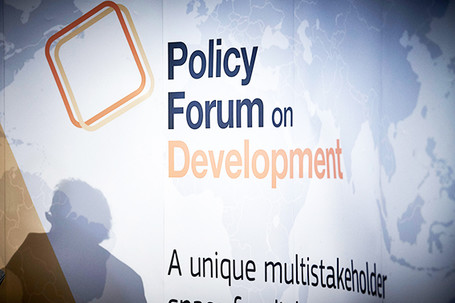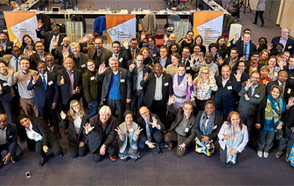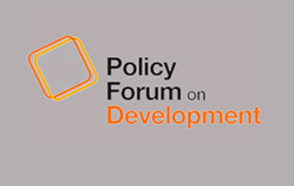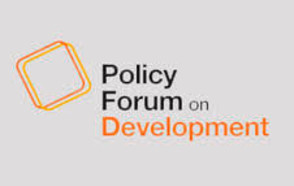
Photo Credits: Photos@Reporters
Between the 13th and the 15th of March 2019, the Global Policy Forum of Development by the European Commission was held in Brussels. This year’s meeting was looking as a milestone one: many new partners from Civil Society have joined the Frame Partnership Agreement, and the dynamic has raised a new level in the Dialogue between the EU and its partners.
The 2019’s edition of the Global PFD has known significant participation: more than 130 representatives of civil society organizations (CSO), local authorities (LA), professional and business associations, EU Member States and EU institutions, to support, enhance, showcase and look for solutions around one world deliverable: the 2030 Agenda. From the Local Authorities side, CLGF, AIMF, Platforma and UCLG, with the regional sections such as UCLG-MEWA, UCLG ASPAC, FLACMA and UCLG Africa, were attending as well as the world secretariat, with the Secretary General, Emilia Saiz, acknowledging the road paved by both partners through this partnership, as well as recognizing the key role that this partnership and Dialogue with CSOs has played in sharing values at global level, principles and exchanging on common challenges, and the need for a specific Dialogue intra-governmental.
An intense Dialogue between all participants highlighted the challenges that local democracy knows in some places of the world, and the role of Local Authorities when dealing with these challenges, as well as the solutions that are needed from the local level.
 The key role of Local Governments was recognized when discussing and developing Agenda 2030, from all levels of governance, to build an enabling environment for implementation: “developing a territorial approach in implementation is in its investments too”, said Wim Dries, Mayor of Genk and President of VVSG, highlighting the fact that no development can be done if the VNRs (Voluntary National Review) do not take into account the local efforts in implementing, and recognizing that these efforts will not be sustainable without investments. The role of cooperation is key in this regard. “Our member states need local measurements to enable them to take decisions and do the reports. We all know that the 2030 Agenda will happen locally” said Stefano Manservisi, Director General for International Cooperation and Development, Directorate General for International Cooperation and Development, European Commission
The key role of Local Governments was recognized when discussing and developing Agenda 2030, from all levels of governance, to build an enabling environment for implementation: “developing a territorial approach in implementation is in its investments too”, said Wim Dries, Mayor of Genk and President of VVSG, highlighting the fact that no development can be done if the VNRs (Voluntary National Review) do not take into account the local efforts in implementing, and recognizing that these efforts will not be sustainable without investments. The role of cooperation is key in this regard. “Our member states need local measurements to enable them to take decisions and do the reports. We all know that the 2030 Agenda will happen locally” said Stefano Manservisi, Director General for International Cooperation and Development, Directorate General for International Cooperation and Development, European Commission
In this regard, new EU instruments were shared, such as the Multiannual Financial Framework (MFF) and the proposal for a new Neighbourhood, Development and International Cooperation Instrument (NDICI).
Stefano Manservisi also confirmed that a new kind of Dialogue with Local Authorities should be completing this Forum frame to enable a direct exchange between Local authorities and EU decisions makers. This is a new milestone for Local authorities in the EU cooperation, that was recognized in the Declaration, that acknowledges others key issues in the frame of development, including:
- Environment and climate as global challenges to be addressed in priority
- enhancing the Dialogue between the LA and the Civil society to generate a coherent development through the 2030 Agenda
- integrating the rural-urban linkages in the objectives for implementation, where Intermediary Cities play a key role
- Visit the PFD group page (capacity4dev.eu)













